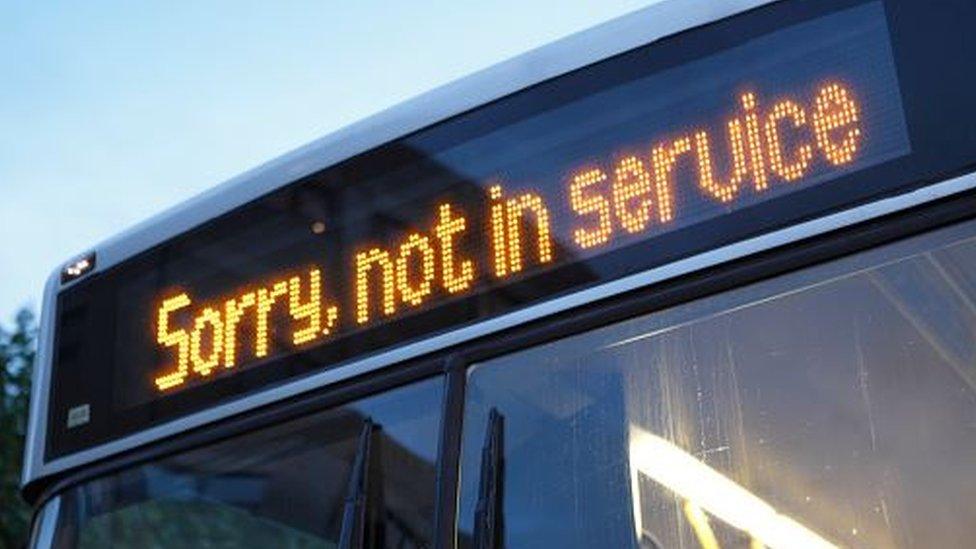Translink: Widespread disruption caused by transport strike
- Published
- comments
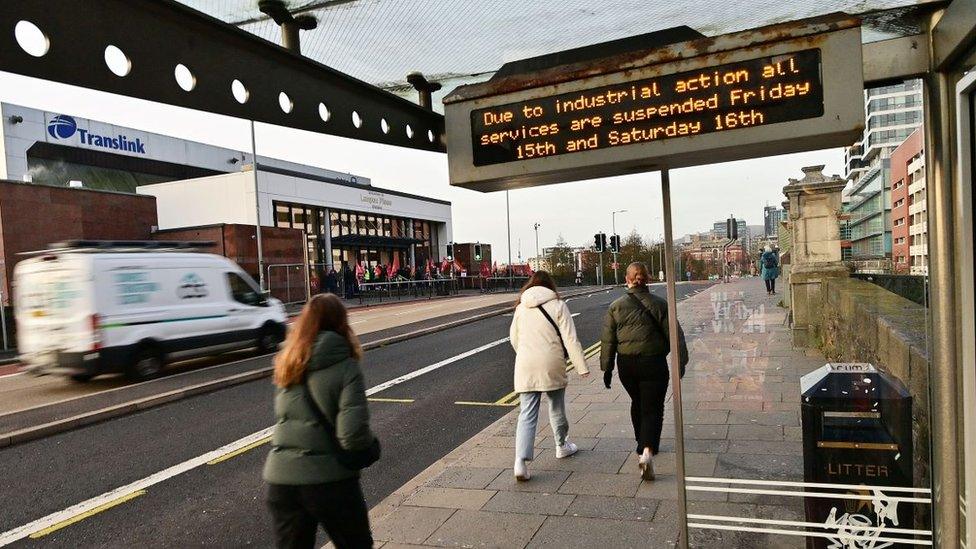
Strikes are being held on Friday and Saturday, with another day of action scheduled for 22 December
Public transport workers in Northern Ireland are staging a 48-hour strike in a dispute about pay.
Trade unions Unite, GMB and Siptu are involved in the action on what is traditionally one of the busiest weekends before Christmas.
Translink has apologised for "any inconvenience" that will be caused.
Dr Graham Gault, from the National Association of Headteachers, said many hundreds of pupils could not attend school as a result of the strike.
He added there were additional impacts on school meals and school trips.
"The employers really should have settled this dispute long before now, thereby avoiding the widespread impacts across education," Dr Gault told BBC News NI.
The Education Authority said it was expecting "significant disruption" to school transport given the "scale of the action", which has affected bus, rail and Glider services.
A further strike is also scheduled for 22 December.
Eamon Sturgeon, a bus driver on a picket line in Belfast, said workers felt they had "no other option but to strike".
"The support from the public is great, they understand that we deserve to be paid right," he told BBC News NI.
Bus and rail strikes: Why NI's public transport isn't running (in 109 seconds)
Northern Ireland Secretary Chris Heaton-Harris has been engaged in talks with Stormont's largest parties this week about the restoration of the executive, with a £2.5bn financial package on offer from the UK government.
This would include provision for public sector pay increases.
The unions previously took strike action on 1 December.
'We want concrete pay talks'
On Friday, Davy Thompson from Unite said the action being taken is "both proportionate and reasonable".
He said that strike action is a "very last resort", adding: "The secretary of state with the stroke of a pen could fix this."
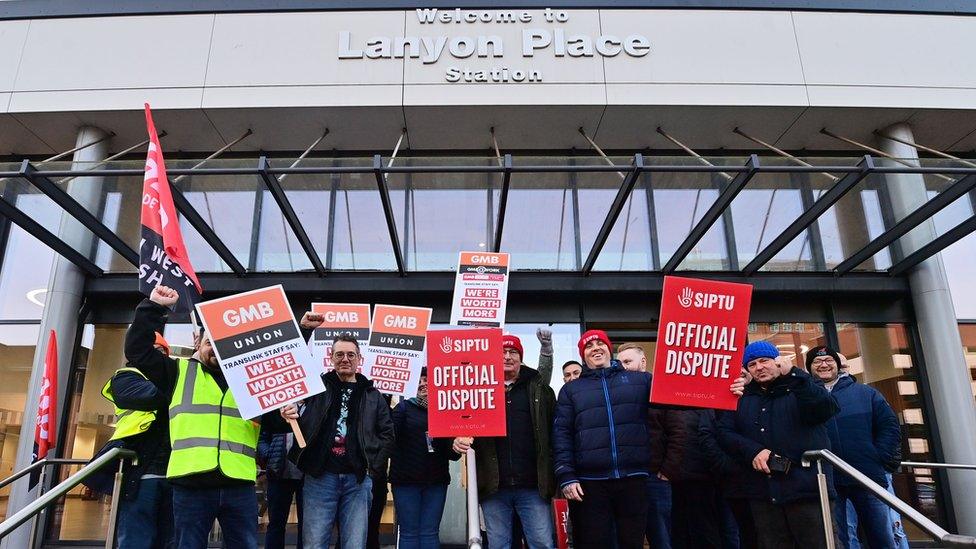
Translink staff gathered at Belfast's Lanyon Place station to demonstrate over pay
Damien Doherty, a bus driver in Londonderry, said on Friday: "There isn't anybody standing on a picket line this morning that actually wants to be on a picket line, we've been forced out on to it."
He told BBC NI's Good Morning Ulster workers "are sick to the back teeth of potential, we want concrete pay talks".
Speaking to BBC News NI at the picket line in Derry on Friday morning, Brian Warke, a bus driver at Pennyburn bus depot in the city, said his colleagues are struggling.
"People can't pay their mortgages," he said.
"We have been offered a zero per cent pay rise this year from April. And that's why we have had to make this decision today to come out together.
"We just need help here."
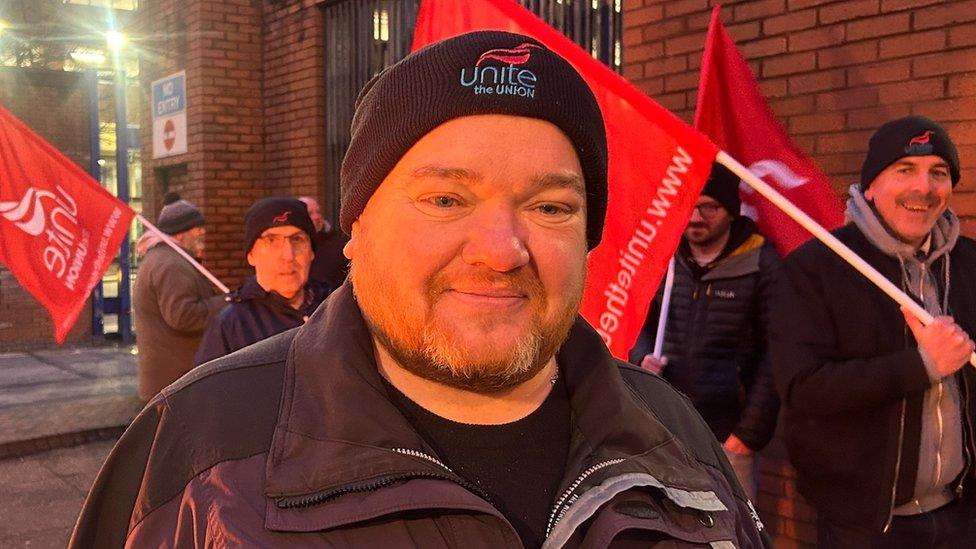
Bus driver Eamon Sturgeon in Belfast said workers had "no other option but to strike"
David Shearer, a train conductor and union representative with SIPTU in Londonderry, added: "We are frontline workers and have worked all through the Covid-19 pandemic and the government aren't taking us seriously."
He was joined by conductors, train signallers and porters on the picket line at the city's North West Transport Hub on Friday.
"I've been here from 06:30 this morning and we haven't had one complaint from anyone who missed a train or anyone walking past," he said.
Retail and hospitality 'destruction'
The action has faced criticism from representatives of the hospitality and retail sectors as it falls during one of the most lucrative periods for both.
Stephen Margorrian, of hospitality collective Horatio Group, said the latest round of strikes could lead to some closing their doors for good.
"We're expecting to be down quite a considerable amount," he explained.
"I know for a lot of businesses in our sector, they were already pessimistic about next year and for some people this will just be destruction."

Christmas is the busiest time of year for many hospitality businesses, Stephen Margorrian says
Retail NI chief executive Glyn Roberts said the timing of strikes "leaves a lot to be desired" as it targets some of the industry's busiest days.
"There are independent retailers that are on life support who are depending on this Christmas to help them through to keep the doors open and to keep workers employed," he said.
He urged unions to reconsider planned action for next week and wait for a political breakthrough.
Janice Gault, chief executive of the Northern Ireland Hotels Federation, said her industry had not reported many room cancellations so far but the strike had affected staff travel and some passing trade.
"We would like to see people dropping in for that ad hoc drink - a glass of wine, cup of coffee, and if people aren't coming in to shop, that's a big impact," she said.
"We aren't a standalone business; we're relying on bars, restaurants and the retail industry who have no doubt been very severely impacted by this."
Translink said it was "fully committed to entering constructive pay negotiations," adding: "This can only be done once the budget issue has been resolved".
"This situation impacts all public sector workers and needs to be resolved at the NI Executive level," it said.
"We have urged our colleagues to reconsider and pause this action in light of the social and economic impact it will have at this time and to await the outcome of political talks."


The key to why we have seen so much disruption in the public sector is because people have seen the real value of their wages eroded quite substantially in a short period of time.
If Stormont was to come back next week, people, for example, would not expect to see their pay increasing in their January pay packet.
There's certainly money on the table, but there would have to be a process; an agreement reached between employers and unions, before you would actually see that pay flowing through to people.
So you could even be talking up into the spring before all that's sorted out.

The president of the Secondary Students Union NI (SSUNI) said young people were among the hardest hit as they were among the main users of public transport.
"Some schools have closed today, further disrupting education, while many students will not have been able to get into school," said Ellen Taylor from SSUNI.
"However, while we do not appreciate this disruption to education, we also acknowledge that Translink workers are underpaid and undervalued, and we support their calls for a pay rise.
"This is an endemic issue across Northern Ireland," she added, stating that public sector workers were taken for granted.
Bus lanes operational
One of the private companies which operates services linking City of Derry, Belfast International and Dublin airports says it will be doubling its capacity on Friday and Saturday.
Many have called for cars to be allowed to use the bus lanes as the volume of traffic is expected to increase considerably on Friday and Saturday.
In a statement the Department for Infrastructure said bus lanes would remain operational during the industrial action for "cyclists, motorcyclists, permitted taxis, any operating buses, which could include buses provided by health and education authorities, and the emergency services".
"Bus lane enforcement will continue as normal," it continued.
Related topics
- Published1 December 2023
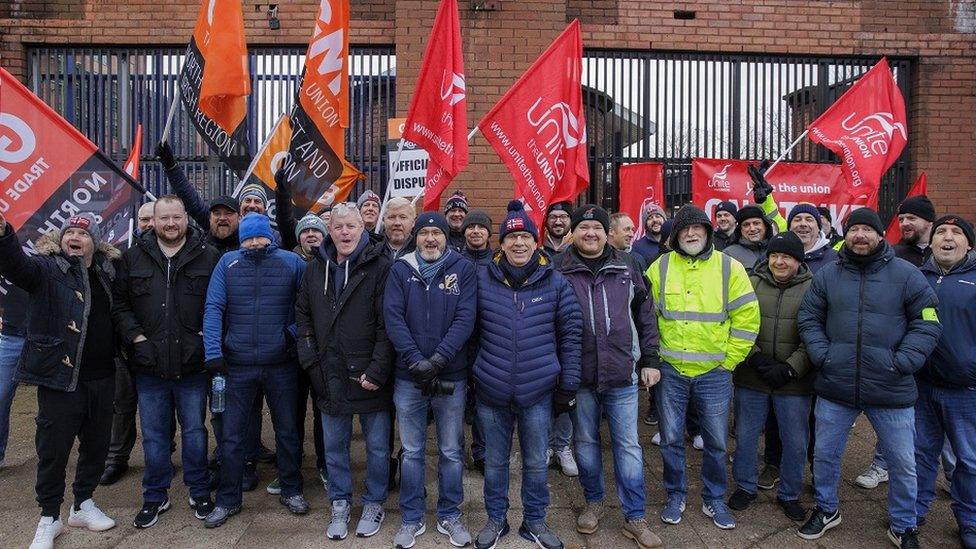
- Published14 December 2023
